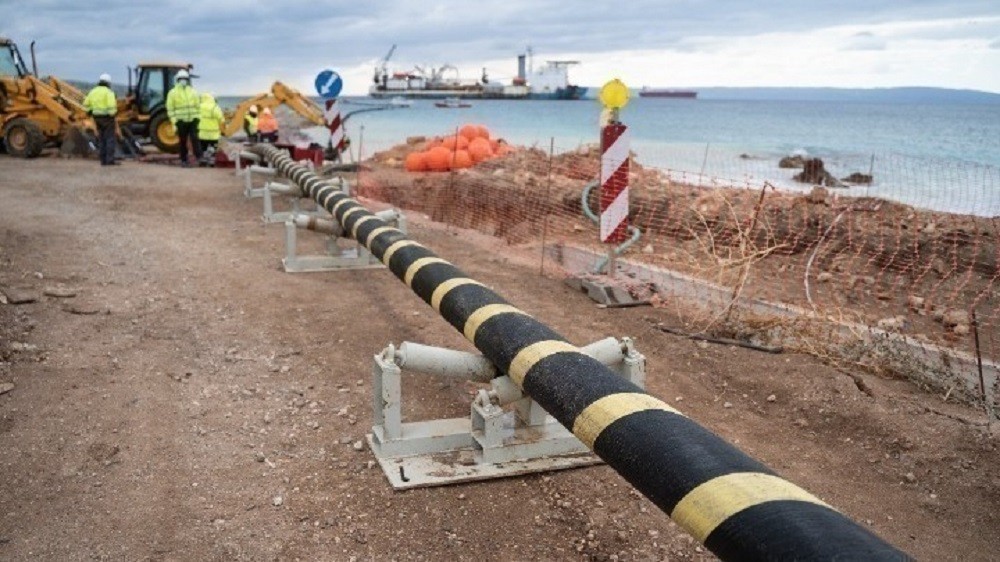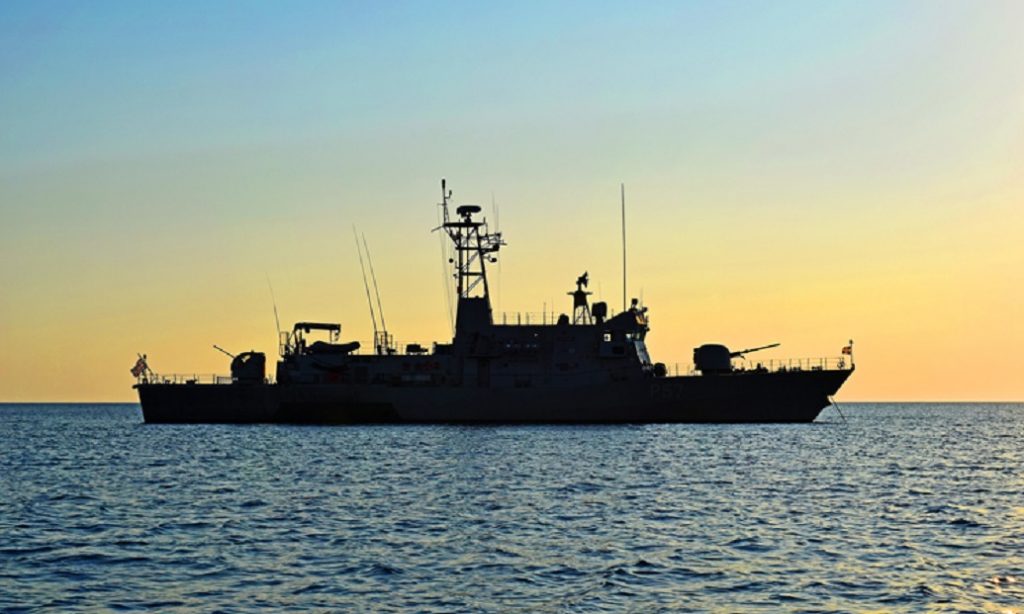
The Ordeal of the Exclusive Economic Zone of Greece: The Americans want Athens to share the hydrocarbons of the Eastern Mediterranean with Turkey

Το ελληνικό Πολεμικό Ναυτικό προστατεύει τα ελληνικά νησιά του Αιγαίου από την τουρκική επιθετικότητα. Φωτογραφία Π.Ν., υπουργείο Άμυνας
By Professor Theodore Kariotis
Part V of that United Nations Convention of the Law of the SEA provides for an “Exclusive Economic Zone” (EEZ) extending 200 nautical miles seaward from the coast.
If all coastal states thus exercised their jurisdiction over their own EEZs, some 38 million square nautical miles would become their “economic patrimony. The oceans represent 71% of the total surface of the earth and that 32% of that area falls under the jurisdiction of coastal states.
Consequently, inside these economic zones would lie 90% of all global fishing, 87% of all oil deposits, and 10% of all polymetallic nodules worldwide.
The Exclusive Economic Zone of Greece and Cyprus

Presently, 168 countries had claimed 200‑mile EEZs or had established a 200-mile Exclusive Fishing Zone (EFZ). The countries benefiting the most from the EEZ concept are — in order of the size of their EEZ — the United States, France, Australia, Russia and Indonesia. If this concept were to be applied by all coastal Mediterranean states, the entire sea would be covered by EEZs of the littoral countries. The countries of the Mediterranean that would benefit most from an EEZ are Greece, Cyprus, Italy, and Malta.
With its EEZ, Greece will safeguard the economic unity of its continental and archipelagic space. Greece has a total of 3,100 islands of which 2,463 are in the Aegean. By comparison, Turkey has only three islands in the Aegean.
- Turkey has an EEZ
Greece has not declared an EEZ but Turkey has one! At the end of 1986, Turkey unilaterally proclaimed a 200‑mile EEZ in the Black Sea. This move was in accordance with the provisions of UNCLOS, which ironically Turkey has never signed or ratified and has always opposed. Concurrently, Turkey reached an agreement on the delimitation of the EEZ with the former Soviet Union. This agreement used the equidistance method and there were no provisions of special circumstances or any reference to enclosed or semi-enclosed seas. Thus Turkey, by accepting the concept of the EEZ as developed through UNCLOS, has weakened its position vis-à-vis Greece. This represents the fatal mistake for Turkey, a veritable Achilles heel in its dispute with Greece. The Black Sea is a semi‑enclosed sea similar to the Aegean Sea, thereby putting Turkey in a difficult position should Greece use the method of the median line.
- THE HAGUE ISSUE
It is difficult and perhaps foolhardy to try to predict what kind of decision the International Court of Justice in The Hague (ICJ) will take, in case the Greek-Turkish dispute over the continental shelf and the EEZ of the Aegean is finally referred to it.
However, looking at previous rulings of the International Court of Justice in similar disputes, it can be assumed that the Court will use in this case the principle of “equal distance-special circumstances” instead of only the principle of equal distance (median line).
Although we cannot conclude that a zone of 12 nautical miles around the islands will be the empirical method for the next delimitation decisions of the International Court of Justice, we can nevertheless insist that clearly the EEZ of an island cannot be less than the internationally established and recognized maximum of the territorial sea.
If a 12nm zone is given to the Greek islands of the eastern Aegean, then Turkey’s EEZ will be limited. If the delimitation is done on the basis of the new 1982 Convention on the Law of the Sea, Turkey will receive only 7.5% of the total area of the Aegean Sea. But, since the International Court of Justice, in its latest rulings, has emphasized the principles of fairness, the area Turkey will receive will be about 10-12% of the total EEZ of the Aegean, provided of course that the Greek islands are entitled to a zone of 12 nautical miles.
The main problem that Greece will face at the International Court of Justice in The Hague is that of Kastelorizo and Stroggyli, because the Court, in cases where an islet is located in front of a vast continental area of another state, never gives “full effect” to that islet. If this happens, then Greece will have no maritime border with Cyprus. For this reason, the inaction of the governments of Greece over the last 30 years not to declare an EEZ and to proceed with the delimitation of EEZs with Cyprus is a huge mistake.
Of course, what has not come to our attention is the fact that Turkey will not accept The Hague’s decision, no matter how positive it may be for its interests, because it is in its interest to perpetuate the Greek-Turkish conflict. The entire philosophy of the neo-Ottoman state is based on the existence of a permanent enemy to their West, and so it will follow the same line as China by not complying with the Hague ruling. This will undoubtedly be an outrageous act, because China is ignoring The Hague decision because it has suffered a heavy defeat, while Turkey will not implement a decision that will probably be favorable to it.
The history of Hellenism is intertwined with the sea, but the latest Greek governments seem to ignore it, leaving the Cypriots, Israelis and Egyptians to exploit the waters of the Eeastern Mediterranean on their own. The specter of the EEZ will haunt us if we don’t wake up soon.
- The Role of the Americans
The Americans have been dealing with the Greek-Turkish dispute since 1973, when the stupid colonels who ruled our country announced, pompously, that we would become a new Saudi Arabia because of the oil field found on the shores of the island of Thassos. It is very important to understand that until that year there was no violation of Greece’s air and sea space!
I have repeatedly written that the Americans want us to share the hydrocarbons of the Eastern Mediterranean with Turkey because they do not want to lose Turkey and throw it into Russia’s arms. They believe that the joint exploitation or rather the co-management of the hydrocarbons of Greece and Turkey must be achieved at all costs. The US knows that Turkey has no hydrocarbons, but it wants to share its non-existent hydrocarbons with Greece and Cyprus!
Since 1922 the Turks have always considered that they had long coasts, but they did not have a large sea and after 1982 they realized that their sea was further reduced. So they started a dangerous rhetorical war, with two hot exceptions (1987 and 1996), but from 2018 they began to make paranoid demands that will surely continue in the future.
Turkey, with aggression and brazen audacity, continues for 50 years an aggressive and expansionist policy in the Aegean and in recent years in the Kastelorizo complex as well, constantly putting forward unfounded claims in violation of all rules of international law.
Americans are reckoning that the two countries have never been so close, in a calm environment, with two leaders who achieved decisive victories in their recent national elections and are preparing for a major rapprochement move that the United States wants to help with whatever means it has. And the Americans not only have the means, they know exactly what they want.
First, they do not think that The Hague is the solution, because they believe that the Turks will not be satisfied with a solution that will not only not fully satisfy them, but because a peace on the seas favors the Greek side.
Second, the Americans, after mediating the EEZ delimitation between Israel and Lebanon, want to appear as honest mediators between Greece and Turkey with a plan that would donate the entire Aegean Archipelago to Greece and allow Turkey to take a piece of the Greek sea in the Eastern Mediterranean and of course the Greek hydrocarbons located in the area.
Finally, they keep as a backup a third, cunning plan. That is, to propose to the Egyptians to demarcate an EEZ with Turkey starting from the 28th Meridian, that is, where the partial delimitation of Greece with Egypt has ended.
The only way for Greece to stop these plans is, immediately and before it is too late, to delimit its EEZ with that of Cyprus on the basis of the median line, according to UNCLOS provisions, which will give full effect to the island of Stroggyli, with the result that Turkey has no maritime border with Egypt and of course not with Libya.
- Epilogue
We are surrounded by hydrocarbons in the eastern Mediterranean and we are staring at the Cypriots, Egyptians and Israelis who exploit them. If Greek governments had not shown an incomprehensible disregard for the value of the EEZ and declared it at the beginning of the 21st century, perhaps Greece would have avoided the economic tragedy of the second decade of this century, or at least would have been able to ease the burden of the crisis. The exploitation of hydrocarbons located in the depths of our seas is Greece’s most important investment that will lead to real development. Professor Antonis Foscolos figures for the valuation of the deposits may seem astronomical, but we will never know the truth unless we start exploring the energy wealth hidden especially in the areas to the south of Crete.
But now it seems that a frivolous and dangerous policy is being pursued that may trap us in sharing our hydrocarbons in the Eastern Mediterranean with Turkey. In conclusion, Greece must immediately declare its sovereign rights in EEZs, based on international law as expressed in UNCLOS and not be possessed by a phobic syndrome. The late President of Cyprus, Tassos Papadopoulos, declared an EEZ in 2004 with only four tanks and two helicopters and was not afraid of Turkey, which simply announced that it does not recognize the Cypriot EEZ, while the United States and the EU accepted it immediately.
Of course, such an EEZ would not only be available to the mainland, but also to all Greek islands. Thus, Greece will acquire an EEZ that will have an area three times that of the mainland. According to the EEZ principles, the largest percentage of the Aegean Sea and its natural resources will belong to Greece and in this way there will be no need to discuss with the Turks whether our islands have a continental shelf or not.
Ακολουθήστε τη HELLAS JOURNAL στη NEWS GOOGLE

